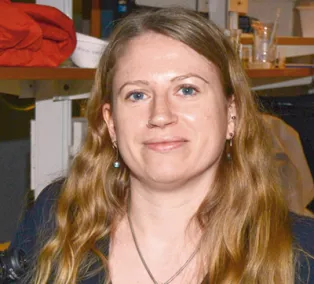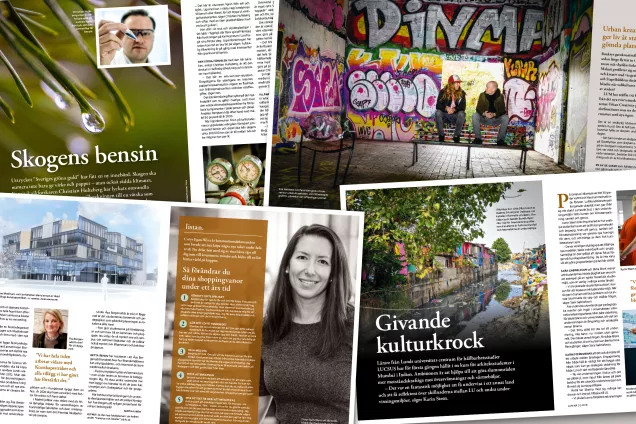For many years, Jessica Abbott has conducted research into how sex differences arise and how they develop from an evolutionary perspective. She is fascinated by what happens when two different bodies, i.e. the male and the female, are to be formed from the same genetic information. Genes specifically are the central starting point of her research.
She is particularly interested in cases where the exact same gene shows contrasting survival effects in males compared to females; scientifically, this is known as sexual antagonism. This area could provide interesting clues to deeper knowledge within evolutionary biology. To find answers, Jessica Abbott uses animals suitable for experimentation such as fruit flies, dragon-flies and flatworms. A couple of years ago, her research resulted in a prestigious grant from the European Research Council.
But considering our own species, humans, from a strictly biological perspective is immensely more difficult, she observes. What can evolutionary biology really say about maleness and femaleness?
“It turns into rather a lot of speculation. Biology and societal structures both play a role”, says Jessica Abbott.
She points out that women can also play evil power games and repress others that they consider to be socially inferior. Although this usually, but not exclusively, takes forms that are other than sexual. The fact that sexual harassment specifically is more common from men with power can surely be partially explained by society’s expectations of maleness and femaleness, according to Jessica Abbott.
“But I believe biology also contributes insofar as, from an evolutionary perspective, males usually benefit from wanting to mate more than females, so the step towards exploiting your power for sexual purposes could be somewhat shorter for men than for women”, says Jessica Abbott.
But why then do males generally seem to have a greater tendency to want to mate in the animal world? Could this be explained biologically by the two different sexual strategies that exist at the cellular level, namely ova and spermatozoa? In our own species, these two sexual strategies are clearly distinguished – the female can deliver only one ovum per month whereas the male, with his multitude of sperm cells, has significantly more opportunities to ensure his genes are passed on within the same period of time. Could such a profoundly biological difference in sexual strategy contribute to influencing human behaviour?
“It is not unreasonable to find a connection. Such sexual strategies are fundamental within all research into sexual selection. But you have to consider the whole mating picture. Several different factors can enter into play even from a purely biological perspective, for example different ecological factors”, says Jessica Abbott.
“When it comes to biological research into humans as a species, certain properties are easier to analyse than others”, points out Jessica Abbott. One such example is our height. Previous studies have shown that this property mostly - around 80 per cent - depends on our genes and only to a small extent on the surrounding environment.
It is more difficult to conduct evolutionary biology research on properties more closely linked to our behaviour. Here, the classic question on nature versus nurture becomes a hard nut to crack.
“It becomes problematic to measure aspects that concern personality. And it is impossible to determine how much depends on biology as opposed to culture”, says Jessica Abbott, observing that this is the reason behind the popularity of studies of identical twins who have grown up in different environments.
For example, it is difficult to measure people’s sexual appetite or the factors that influence their choice of partner. How many of their survey responses are characterised by what the respondents feel as opposed to what they expect to feel? At any rate, it seems to be the case that genes and biology in general have less and less influence on the differences between the sexes the closer we get to investigating properties linked specifically to our behaviour and our thoughts, points out Jessica Abbott.
“Sex differences in this context are small compared to the differences between individuals regardless of gender”, she says.
When it comes to studies specifically examining human sexual behaviour and mating strategies, few aspects lend themselves to scientific investigation from an evolutionary biology perspective, according to Jessica Abbott. If we compare humans to our closest relatives, gorillas and chimpanzees, we can observe that humans, from an evolutionary perspective, have developed a mating strategy based on pair relationships or small groups of the order of one man and a few women or the reverse, two men and one woman, which can be the case if people are living in an environment with scarce resources.
“The human strategy is midway between that of gorillas and that of chimpanzees”, says Jessica Abbott, explaining that among gorillas, a whole flock of females gathers around a dominant male, whereas the chimpanzees’ strategy is that everyone mates with everyone.
Quite generally one can say, from a biological perspective, that human behaviour is about acquiring status, because we are social animals. There is no difference here between the sexes; both women and men want to have high status, basically in order to increase their chances of survival, according to Jessica Abbott.
She is involved in the gender equality and equal opportunities committee at the Faculty of Science. Through her work on equal opportunities issues, she sees that sexual abuse of power constitutes a fraction of the total amount of abused power at work. It is more common for both genders to abuse power in ways that are other than sexual, she says.
“Those subjected to abuse of power are those that have the most to lose by speaking up. The best way of tackling the problem is to find solutions that do not entail feeling exposed if you complain about misconduct”, says Jessica Abbott.
She observes that humans as a species are very flexible. From an evolutionary perspective, this ability to adapt is our strength. It also gives hope for the future, even with regard to gender issues seen in the light of the #metoo movement, according to Jessica Abbott.
“We are shaped by prevailing values and expectations. If sexual abuse of power at work is no longer accepted at all, it will be possible to bring about change here”, she says.
Lena Björk-Blixt



